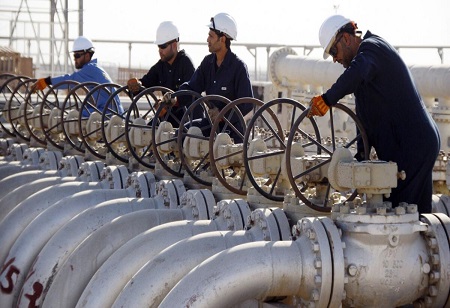
Saudi Arabia, UAE and Others Lower Oil Production in Surprise Move

 As a preventative action to protect the stability of the oil market, Opec+ members Saudi Arabia, the UAE, Iraq, Kuwait, Oman, and Algeria will voluntarily reduce their daily oil output by more than one million barrels starting in May.
As a preventative action to protect the stability of the oil market, Opec+ members Saudi Arabia, the UAE, Iraq, Kuwait, Oman, and Algeria will voluntarily reduce their daily oil output by more than one million barrels starting in May.
During its forthcoming meeting, the group of 23 oil-producing nations, which reduced its total output by two million barrels per day last year, was anticipated to adhere to the established production levels.
From May until the end of the year, Saudi Arabia, the largest producer and exporter of oil in the world, will reduce its output by 500,000 barrels per day (bpd).
As per Suhail Al Mazrouei, the UAE's Minister of Energy and Infrastructure, the country will reduce its output by 144,000 bpd during that time.
“This voluntary initiative is a precautionary measure taken to ensure market balance and comes in alignment with the production cut agreed upon during the 33rd Opec and non-Opec Ministerial Meeting (ONOMM), held on 5th October 2022,” Mr Al Mazrouei said.
To "stabilise the market," the Iraqi oil ministry also announced a reduction in production of 211,000 barrels per day beginning on May 1.
While Russia said that the production cut it had been undertaking from March to June would continue through the end of the year, Kuwait and Algeria joined the voluntary limits in oil output.
Oman has made the decision to cut its crude oil output by 40,000 bpd.
Goldman Sachs recently lowered its predictions for oil prices in 2023, citing rising crude supply and declining demand. The investment bank has updated its forecast for Brent, predicting that it would trade at $94 in the next year and at $97 in the second half of 2024. The benchmark was predicted to trade at $100 in both cases in an earlier forecast.
The supply disruption caused by a Turkish port continued to have an impact on an already constrained market as oil prices closed higher last week, marking their second week in a row of rises.
Two-thirds of the world's oil is measured by Brent, which increased 1.64 percent to reach a settlement price of $79.89 per barrel. The gauge used to track US crude, West Texas Intermediate, increased 1.75 percent to close at $75.67 per barrel.
WTI prices increased by 9.3 percent, while Brent prices increased by 6.5% over the previous week.
Notwithstanding the increase, Brent has decreased by around 7% since the year's beginning.
The announcement comes after a record reduction in petroleum output in October by the 23-member alliance of oil-producing nations, which was the group's largest production drop since the start of the Covid-19 epidemic in 2020.
According to a statement at the time from Opec+, the decision was made "in light of the uncertainty that surrounds the global economic and oil market outlooks, and the need to enhance the long-term guidance for the oil market, and in line with the successful approach of being proactive and pre-emptive."
Opec has increased its prediction for Chinese oil demand growth in 2023, as the nation gradually resumes economic activity following the conclusion of nearly three years of zero-Covid rules.

